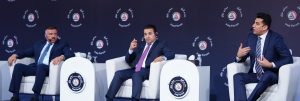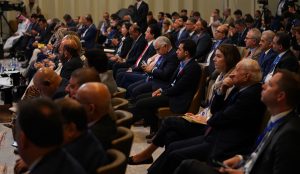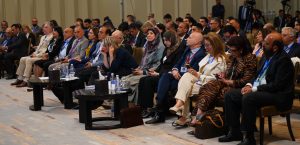- Abdul-Amir Kamil Al-Shummary, Minister of Interior
- Qasim Al-Araji, National Security Advisor
- Khalid Al-Yaqoubi, Advisor to the Prime Minister of Iraq
- Thomas Röwekamp MP, Member of the German Parliament
- Suadad Al-Salhy, Senior correspondent, Middle East Eye (Moderator)
Iraq’s security sector and its armed forces have been allowed to evolve naturally, without design and outside the Constitution’s framework. Too many armed state and non-state actors have grown exponentially and now pose a major challenge to the state’s ability to monopolise violence. The ISIS onslaught in 2014 and recent attacks from neighbouring countries have exposed the major weaknesses in Iraq’s security sector and its armed forces.
Reforming the security sector is now an urgent priority in Iraq, and requires administrative and operational restructuring, modernisation and capacity-building. Iraq has benefitted from the support of a number of international partners, who have offered operational support and capacity building assistance. The new government in Baghdad has indicated its commitment to reforming the sector and bringing the forces under a unified command and control. Moderated by Suadad al-Salihy, this panel of policy makers and experts outlined their visions and practical steps for security sector reform and the restructuring of the armed forces in Iraq.
Abdul-Amir Kamil Al-Shummary, the country’s Minister of Interior, told the audience that the armed and security forces should be integrated. Iraq faces serious challenges and needs better capacity building, including surveillance systems. “Iraq’s cities need better resources,” he added, calling for better digitisation, CCTV, surveillance cameras and more. “One camera might replace the need for five people [security personnel],” he said, and there is a great use for better technology in Iraq to serve the people more efficiently and effectively.
Some parts of the 3,500km of borders Iraq shares with neighbouring countries are exposed to terrorist threats and authorities must take control of these, Al-Shummary added, stressing that the Syrian border is 95% under control. “We dug the ground [and] extended walls,” he told the audience, adding that as for the challenges with some borders with Saudi Arabia and Jordan, Iraq needs to enhance those procedures for better mutual trust. “The Iranian side has some issues when it comes to drug trafficking, and so we have started having checkpoints,” the minister added. Another improvement, Al-Shummary suggested, would be the hiring of new staff, as most current employees in the security sector “are older than 50 or even 60 years, and these people are less capable of taking risks.”

Qasim Al-Araji, Iraq’s National Security Advisor, agreed with the minister of interior that the mix of security and military was a result of the wars fought, but that the government is now keen to include and take these groups back into the same model, although the Peshmerga in the KRI will still maintain their own control. “When security sector reform begins, we will build up the capacity of members,” Al-Araji said. “Security members and officers should be aware of human right laws and not violate the human rights of the citizens,” he added. While the country does not need to increase the numbers of security forces, he told the audience, there is a requirement to integrate them.
Iraq is missing international support in terms of the repatriations of al-Hol camp residents in northeast Syria, Al-Araji added. Iraqis make up more than half of the population of the camp which houses over 50,000 residents, most of whom are wives and children of ISIS fighters. “The number of families who [have] returned back to their places of origin [in Iraq] is around 600, and until now we have not received a single complaint about their presence in their areas,” the National Security Advisor said, praising the repatriation and rehabilitation process.
Al-Araji added that Iraq has welcomed home nine large groups of nationals to Iraq from al-Hol camp, all of whom have successfully undergone rehabilitation and are now residing in their places of origin. “The al-Hol camp … is a ticking time bomb. If a ticking time bomb exists in a place, do we wait or do we work to defuse the bomb?” Al-Araji warned. “Many of the world’s countries have now started to repatriate their nationals from al-Hol camp,” he said, and he hopes to see more of this. “We need to protect our nationals and save our children [from the camp],” the National Security Advisor stressed. There are around 10,000 foreign nationals in the camp, and 20,000 Iraqi children under the age of 20, he told the audience. “Iraq has taken steps to help the repatriation … and we have held meetings with Jeanine Hennis-Plasschaert and others, and now a lot of other countries are taking their nationals from the camp and transferring them so there is international engagement,” Al-Araji said.

Thomas Röwekamp MP, Member of the German Parliament, told the audience that the battle against Daesh was a success. “The German government, together with 85 other international partners, supported the ISF [Iraqi Security Forces] in this fight… Daesh [ISIS] has been defeated but it has not disappeared,” Röwekamp said about the fight against terror. “From a German perspective, the stability of Iraq is crucial for the stability of the region and therefore we will continue our support for Iraq and especially in military relationships,” he added.
“Germany has to decide every year whether to continue the support,” he told the audience. This vote usually takes place in October, and he is hopeful that they will continue next year. “Iraq has made significant progress in its security,” he continued. “It is not the German focus what structure it takes, [as] we will support them in advising the security forces,” Röwekamp clarified. The Iraqi security forces and personnel must find their own structure, he advised, “[But] there need to be clear lines over which forces are responsible for which duties,” he said.

Röwekamp responded to a question on the international coalition’s approach in Iraq; initially to train Kurdish and Iraqi forces for combat to defend the country against ISIS, and now, “since the fight we have shifted our approach to advising the Iraqi army, and we are not present on an operational basis.” The shift was necessary, Röwekamp added, and was a question of leadership. “It’s like in Ukraine,” he said. “It is not the presence of fighters, but leadership, training, cooperating and advice on request… We do not give structural advice, but operational and logistical support,” he clarified.
Asked by Al-Salihy for a response on the gap between international support and the committing of human rights, for example the crimes that many security members have been accused of, Khalid Al-Yaqoubi, an advisor to the prime minister, said it was important to remember what kind of situation Iraqis were living in in 2003, and then through to 2010 and then the existential threat of ISIS. “I worked with coalition forces and Iraqi forces,” he told the audience. “I can admit in this government that there are big challenges and we are not trying to evade mistakes and problems,” he said. “We are moving towards a moment of success, true success … there is a true will to invest this moment of success to write another success story in building the Iraqi state,” Al-Yaqoubi said.
Questioned on corruption in Iraq’s security institutions, Al-Shummary told the audience that, “Of course we see corruption everywhere, and we rely on and see and adopt very strong measures to reduce corruption.” The country’s Minister of Interior added that, “There are still certain bodies when it comes to organising the intelligence agencies, and we have conducted many things in the past six months and the coming months too.” Regarding the issue of female representation in Iraq’s security forces and whether the availability and presence of women is a priority, Al-Shummary told the audience there is a department for female empowerment, and that Iraq is learning from Jordan and Saudi Arabia who have special women’s units to confront domestic violence and promote peace and unity. “We are working on establishing a women’s unit,” he said.

On the security along the Iraqi-Turkish border, Al-Shummary said that the area is not easy to take under control as it is essentially a battlefield between the Turkish army and the PKK. “We have agreements with the Turkish side to prevent the crossing of the PKK to Turkey,” he said. “The Iranian border also is a very complicated issue, and we have two brigades in Sulaymaniyah,” Al-Shummary added. “The Iraqi borders, let us be frank, are built on very vulnerable borders… and we are working on [to secure] the Basra borders too.”
Iraq Forum: For Stability and Prosperity
4/05/2023
Session 8: Modernisation and Reform of Iraqi Security and Armed Forces: In Theory and Practice
Session video

